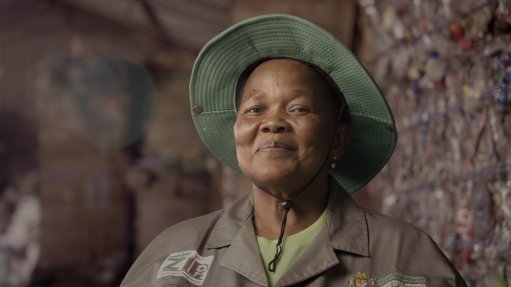
Petco programme ZIP coordinator Linah Ndala
Plastic recycling organisation Petco says sustainability partnerships have contributed to improved waste collection and polyethylene terephthalate (PET) recycling rates, creating income opportunities and developing South Africa’s circular economy.
In the past year alone, Petco and its partners ensured that 90 402 t of post-consumer PET, or 2.1-billion bottles, were collected for recycling.
This saved 560 495 m3 of landfill space and injected R1.2-billion into the economy from the sale of recycled materials.
Petco says more than 40 local, district and provincial municipalities have benefitted from strategic sustainability partnerships in 2021/22, including the Zonda Insila Programme (ZIP), which was launched in Breyton, Mpumalanga, in 2019.
The programme has grown from four projects to 14, which are supporting 240 community members in the Nkangala, Gert Sibande and Ehlanzeni district municipalities, in Mpumalanga.
Another example is that of the Drakenstein municipality, in the Western Cape, which has, in the last four years, successfully integrated waste pickers into the formal waste industry at municipal level.
“With the level of interest shown and the growing number of informal waste pickers, there is no doubt that ZIP is encouraging more young people to [choose] waste as a form of potential income generation,” says ZIP coordinator Linah Ndala.
Petco and its members have been engaging with municipalities on sustainability programmes for the last 17 years to improve waste management practices and recycling rates, including by accommodating waste pickers in the recycling value chain.
“Waste is not trash, it is economy,” states Ndala, emphasising the importance of municipalities, organisations and provincial government taking the lead in this regard.
Petco’s role in such municipal waste partnership projects often involves equipment provision and infrastructure support for waste pickers and buy-back centres, as well as training and skills development for municipal employees that are involved in waste management.
The organisation says there are currently few municipal separation-at-source collections systems and, therefore, Petco works with interested municipalities to establish collection projects and expand PET collection into new areas.
In the year-to-date, Petco has conducted 28 training workshops for more than 1 300 waste pickers in eight provinces, and a further three accredited business training workshops, Petco CEO Cheri Scholtz confirms.
She says the organisation helps to grow sustainable businesses and sponsor infrastructure and equipment to improve the quantity and quality of post-consumer PET collected.
“The impact of partnerships on the recycling value chain cannot be underestimated, and collaboration is crucial to ensuring that change can be implemented at national scale,” Scholtz states.
Petco plans on assisting 21 more sustainability projects with equipment, branding and accredited training.